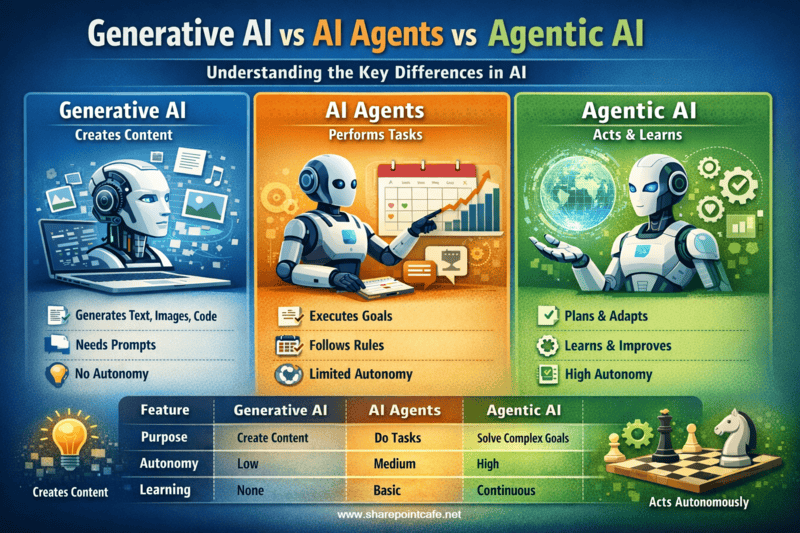In this blog, we will see about Microsoft Azure Storage, benefits of Azure Storage and about Azure Storage accounts.
What is Azure Storage?
Benefits of using Azure Storage
There are numerous reason you should use Azure storage for your data or file system.
- Scalable and Durable to provide space as per your need.
- Automated Backup and Recovery so that you don’t loose your data.
- Data Encryption to make your data secure.
- Support for multiple data types
You may follow this link - Microsoft Azure Certification List Exam AZ 900 Notes: Microsoft Azure Fundamentals
What types of data can we store in Microsoft Azure? Microsoft Azure allows us to store data of any type. But, what are primary data types for which Azure storage is designed for.
Types of Data to store in Azure Storage
- Structured Data: Data stored in rows and columns are referred as Structured Data. Structured data is easy to analyze, access, and query. Structure data is also called as Relational Data as it defines the schema of a table with rows and columns.
- Semi-structured Data: Semi-structured data uses tags or keys to organize the hierarchy of data. It is stored in non-relational format. Semi-structured data is also referred as NoSQL data. XML, JSON, YAML are best example of semi structured data.
- Unstructured Data: These are data which have no defined structure. For example – Media files, Text files, photos, videos.
Storage Options in Microsoft Azure
Several Storage options given by Microsoft Azure.
- Disk Storage – It offers standard HDD for backup, standard SSD which is suitable for light uses, premium SSD for production and Ultra Disk for high usage like SAP HANA, SQL, Oracle.
- Azure Blob Storage – It offers object storage facility in Azure. It is used for huge unstructured data.
- Azure Files – File storage can be shared among multiple Virtual Machines.
- Azure Data Lake Storage – Suitable for Big Data Analytics.
Managed and Un-Managed Disk
Azure Disk storage offers 2 types of disk storage.
- Managed Disk – Handles and manage by Azure. It gives High availability. Suitable for best performance.
- Un-Managed Disk – It is not recommended to use.
Why Azure Storage is a good choice compare to on-premise Storage?
Now that you know about Azure Storage and their features. Let’s look at the reasons that make it better compare to on-premise storage.
- Cost: Microsoft Azure Storage is always a better option in the context of Cost. On-premise storage requires hardware purchasing, installation, configuration, maintenance. You don’t have to do all this in Azure Storage. It gives you pay-as-you-go features. In this feature, you only have to pay as much money as you will use space to store your data and yes you do not have to worry about the cost of installation and maintenance.
- Reliability: Azure Data storage comes with the feature of automatic backup and recovery. So, you don’t have to worry about data loss.
- Types of Storage: Azure Data Storage offers different storage options including distributed access and tier storage.
Data Redundancy in Azure Storage
Azure Storage offers multiple ways of Data redundancies.
Locally Redundant Storage (LRS)-
- It creates 3 synchronized copies in same data center.
- It is less expensive Azure Storage option.
Zone Redundant Storage (ZRS) –
- Creates 3 synchronized copies in 3 availability Zones in primary Azure Region.
- It’s availability is higher than LRS.
Geo Redundant Storage (GRS) –
- It offers all features of LRS.
- Additionally, creates asynchronized copy in secondary region.
Geo-Zone Redundant Storage (GZRS) –
- It offers all features of ZRS.
- Additionally, creates asynchronized copy of data to secondary region.
- It is most expensive Azure storage option.
Preparing for AZ 900? Follow this link - Microsoft Azure Fundamentals (AZ-900) Certification Sample Questions
Microsoft Azure Storage Account
Microsoft Azure offers various types of storage accounts. An Storage accounts contains your data such as blob, tables, and disks. Each storage accounts has their own features and pricing.
Types of Azure Storage Account
- General Purpose v2 accounts : This a basic storage account to store blob, files, disks and tables.
- General Purpose v1 accounts: A legacy type of Azure storage accounts which may not support all features.
- BlockBlobStorage accounts: This is a storage accounts with high performance for blobs. Recommended where transaction rate is high.
- FileStorage accounts: Recommended for enterprise or high performance scale applications.
- BlobStorage accounts: This is a legacy Blob only storage accounts. Use General purpose v2 Azure accounts instead when possible.
How to create Azure Storage Account?
Microsoft Azure provided few tools by which you can create Azure storage account.
- Microsoft Azure Portal
- Azure PowerShell
- Azure CLI
- Management Client Libraries
Create Azure Storage Account using Azure Portal
To create storage account using Microsoft Azure Portal, follow below steps.
- Login to Azure Portal with your account.
- On Azure Portal menu, select Create a resource
- Select Storage
- Select Storage account from this right side panel.
- Under Project details, select subscription
- Select Resource group from the drop-down list.
- Give a name to your storage account
- Select region for your storage
- Then, select Account kind
- Select Replication
- Choose Access Tier
- Under Networking tab, choose connectivity method.
- Select options within Data Protection and Advanced tabs as per your need.
- Finally Review your selection and Create storage account in Microsoft Azure.
Create Azure Storage Account using Azure CLI
Use below command in Azure CLI to create a storage account.
az storage account create
--resource-group [sandbox resource group name]
--kind StorageV2
--sku Standard_LRS
--access-tier Cool
--name [Give a unique name]How to connect with Azure Storage Account?
Azure Storage can be accessible with a REST API to work with your data stored in each storage account. This storage REST API is accessible over HTTP or HTTPS. With Azure Client Library, Azure Storage supports multiple programming languages such as .Net, Java, Python to communicate with Storage account. To add Nuget package use this –
dotnet add package WindowsAzure.Storage
Points to Note on Azure Storage
- Azure offers Block Storage (Azure Disk), File Storage (Azure Files), Object Storage (Azure Blob)
- Block Storage is the default storage by Azure.
- To use any Azure storage, we need an Azure storage account.
- One block storage can be attached with one Virtual Machine. Means, one block storage can not be attached with more than one VM. However, multiple block storage can be attached with one VM.
- File storage can be shared between multiple Virtual Machines.
Hope you like this blog on Azure Storage. Please do share this blog within your community and like our Facebook page and stay connected with us.




Leave a Reply